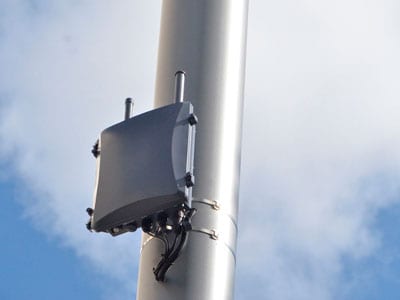
Small cell antenna
San Jose, Calif., officials announced Monday they have reached a tentative deal with AT&T to permit small cell technology on up to 750 city-owned light poles that could pave the way for future 5G wireless rollouts.
Mayor Sam Liccardo, a former member (and critic) of FCC Chairman Ajit Pai’s Broadband Deployment Advisory Council, told residents he would leverage light pole agreements with wireless companies in return for money that can be spent addressing San Jose’s digital divide, starting with affordable internet access for the poor.
The non exclusive 15-year agreement will allow AT&T to bolster its FirstNet first responder network and offer leased access to light poles for $1,500 per pole per year. AT&T plans to initially place around 170 small cell antennas on light poles beginning later this year that can provide enhanced wireless data speeds and improved cell coverage in the city. The first deployment will not include 5G antennas. The deal still faces approval by San Jose’s city council at a May 1 meeting.
The deal is a victory for Mayor Liccardo, who opposed a wireless industry-written bill that was vetoed by Gov. Jerry Brown late in 2017. That bill would have capped pole attachment lease fees at $250 a year, hampering the mayor’s Smart City Vision initiative introduced two years earlier, with a goal of providing affordable internet access for local residents. Had the wireless industry’s bill become law, the city government would have had to find funds for the mayor’s initiative elsewhere.
Liccardo predicted the deal with AT&T will generate up to $5 million in lease fees, with a $1 million advance from AT&T the city intends to use to launch its low income digital initiatives. Few specifics about the mayor’s affordable internet access program were available at press time.
San Jose’s approach is considerably different from that of the states of Texas and Tennessee — both passing new state laws limiting pole attachment lease fees and reducing local control over small cell placement. Mayor Liccardo wants AT&T to share part of its anticipated new revenue from small cell technology to help poorer residents get access to the internet, while Texas and Tennessee hope that deregulation and limited fees and bureaucracy will strengthen the business case for more rapid expansion of small cell networks in both states.
KGO-TV in San Francisco reports on San Jose’s recent agreement with AT&T to deploy small cells on city-owned light poles. (1:47)


 Subscribe
Subscribe